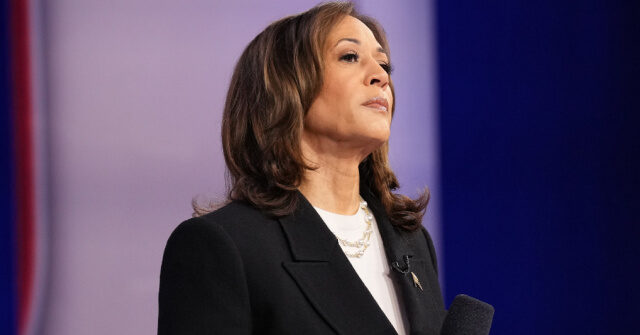In a CNN town hall, Vice President Kamala Harris characterized former President Donald Trump as a “fascist,” marking a significant escalation in her rhetoric against him. This assertion comes amid a range of pressing issues that Americans face today, such as rising inflation, international conflicts, immigration crises, and a contentious political climate marked by the withdrawal from Afghanistan. Harris’s remarks appear to be part of a broader strategy as the Biden-Harris administration seeks to distance itself from past governance, while also painting Trump and his supporters as threats to democracy. Her statements, however, have drawn criticism for failing to address the immediate concerns of ordinary citizens, focusing instead on a narrative that may reflect internal party desperation.
When asked directly by CNN host Anderson Cooper if she considers Trump a fascist, Harris reaffirmed her stance, suggesting that individuals familiar with his character should be listened to when discussing these serious allegations. This approach appears to align with her campaign’s shift towards a more combative tone. Instead of presenting a cohesive vision for the future or an inspiring message, Harris’s criticisms seem to signal a shift away from previous campaign themes of positivity and joy, adopting a more divisive and aggressive strategy aimed at rallying the Democratic base in a potentially fraught electoral landscape.
Political analysts, such as former adviser Mark Penn, have weighed in on what this could mean for Harris’s campaign strategy. Rather than uniting voters under a common goal or vision, Harris’s message contributes to a narrative of desperation, emphasizing anger and bitterness instead of optimism. This pivot in strategy may reflect an awareness of the challenging electoral environment, in which many voters express dissatisfaction with the current administration’s handling of the economy and other pressing national issues.
Additionally, data from Gallup polling shows that a substantial portion of the American populace feels worse off now compared to four years ago during Trump’s presidency. Despite the hardships contributed to by the COVID-19 pandemic, there is a widespread perception that Americans experienced greater stability under the previous administration. This divergence in sentiment indicates a potential vulnerability for the Biden-Harris campaign, as they grapple with public opinion that undercuts their current messaging and paints a less favorable picture of their time in office.
The context of this discussion is significant, as it occurs against the backdrop of ongoing global crises, including the war in Ukraine and heightened tensions in the Middle East with attacks on Israel by Hamas and Iran. Domestically, issues such as illegal immigration and economic inflation have emerged as critical points of concern for voters. By framing Trump as a fascist rather than addressing these urgent matters, Harris may risk alienating moderate voters who prioritize concrete solutions over political name-calling.
In summary, Vice President Harris’s declaration of Trump as a “fascist” signifies a notable rhetorical shift in her campaign strategy, moving toward a more contentious and aggressive approach. While this strategy aims to galvanize support among the Democratic base, it risks overshadowing the pressing economic and geopolitical concerns that many American citizens are facing today. Analysts suggest that such a pivot may reflect underlying challenges for the Biden-Harris administration as it seeks to maintain public support amidst rising dissatisfaction with its policies and leadership. The outcome of this approach remains to be seen as the nation heads toward the next electoral cycle.

